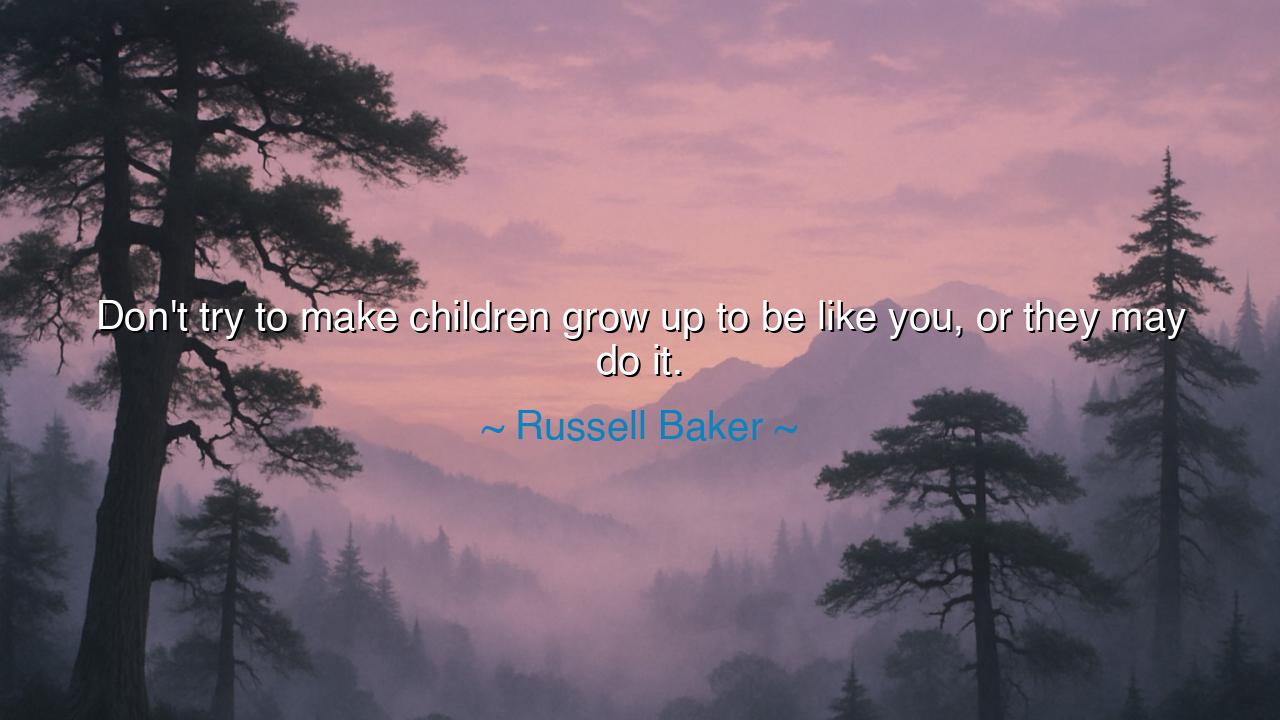
Don't try to make children grow up to be like you, or they may






Russell Baker, with the wit of a humorist and the sharpness of a sage, once declared: “Don’t try to make children grow up to be like you, or they may do it.” What seems at first a playful jest is in truth a profound and cautionary wisdom. For in these words, Baker unmasks both the folly of parental vanity and the sacred responsibility of raising a child not as a mirror, but as a soul uniquely their own.
The essence of his teaching lies in the paradox: parents often dream of shaping their children into reflections of their own desires, ambitions, or lost opportunities. Yet to succeed in this is not a triumph, but a tragedy. For every human being is called to grow into their own being, with their own gifts, flaws, and destiny. To force them into another’s mold—even that of a beloved parent—is to rob them of the chance to discover their true self. Baker’s warning, cloaked in irony, tells us: be careful what you wish for, for you may raise not an individual, but a shadow of yourself.
History gives us sobering illustrations. Consider the reign of Philip II of Spain, who sought to mold his son Don Carlos into a rigid copy of himself, strict, pious, and absolute in rule. But in forcing the child into the father’s narrow pattern, he crushed his spirit, and Don Carlos grew unstable, defiant, and broken. The tragedy that followed was not only the ruin of a prince, but the shattering of a dynasty. This tale reveals Baker’s truth: when parents demand sameness instead of nurturing difference, the result is not greatness but sorrow.
The wisdom here also humbles the parent. For if one insists on making a child like oneself, then the child will inevitably inherit not only strengths but also flaws, magnified and repeated. A parent who is harsh, yet insists on being imitated, will reap harshness. A parent who is fearful, yet demands replication, will pass on fear. Baker’s words strike with irony, but also with warning: in forcing children to resemble you, you risk condemning them to repeat the very faults you hoped they would escape.
Yet his words also hold a more tender truth: that the greatest gift a parent can give is freedom. The child does not need to be you—they need to be themselves. They may carry your blood, your traditions, even some of your tendencies, but their path must be their own. To allow them this space is an act of courage and humility, for it requires the parent to step aside and say, “You are not here to relive my story, but to write your own.”
The lesson for future generations is this: guide your children, but do not mold them. Teach them values, but allow them to discover their own voice. Show them your example, but rejoice when they walk a different way. For the goal of parenting is not replication, but liberation—not to raise a copy, but to release a unique being into the world.
Therefore, let Russell Baker’s words be remembered as a teaching of both humor and warning: do not seek to make your children like you. Instead, seek to make them whole, free, and strong enough to become themselves. For if they grow only into your likeness, the world will have gained no new light, only an echo. But if they are allowed to grow into their own truth, the world will be richer, and your legacy greater than any mirror could reflect.






AAdministratorAdministrator
Welcome, honored guests. Please leave a comment, we will respond soon